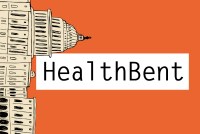Latest KFF Health News Stories
In Part II of this special two-part episode, Alice Miranda Ollstein of Politico, Sandhya Raman of CQ Roll Call, and Sarah Varney of KHN join KHN chief Washington correspondent Julie Rovner to discuss how the abortion debate has evolved since the Supreme Court overturned the nationwide right to abortion in 2022, and what might be the flashpoints for 2023. Also, for extra credit, the panelists recommend their most memorable reproductive health stories from the last year.
What the Health? From KFF Health News: Part I: The State of the Abortion Debate 50 Years After ‘Roe’
In Part I of this special two-part episode, Alice Miranda Ollstein of Politico, Sandhya Raman of CQ Roll Call, and Sarah Varney of KHN join KHN chief Washington correspondent Julie Rovner to discuss how the abortion debate has evolved since the Supreme Court overturned the nationwide right to abortion in 2022, and what might be the flashpoints for 2023. Also in this episode, Rovner interviews Elizabeth Nash of the Guttmacher Institute, about changing reproductive policies in the states.
As States Seek to Limit Abortions, Montana Wants to Redefine What Is Medically Necessary
Montana officials are looking to tighten rules around medically necessary abortions for those who use Medicaid as their health insurance. Reproductive health advocates and Democratic lawmakers have said the move is part of a broader agenda to whittle away access to the procedure.
Abortion Debate Ramps Up in States as Congress Deadlocks
Abortion is a top issue for state lawmakers meeting for their first full sessions since Roe v. Wade was overturned.
Watch: Anti-Abortion Activists Rally in DC in a Watershed Moment for Their Movement
Friday’s annual March for Life rally in Washington, D.C., held for the first time since Roe v. Wade was overturned, signals a new chapter in the anti-abortion movement.
Why People Who Experience Severe Nausea During Pregnancy Often Go Untreated
Because morning sickness is common, severe nausea in pregnancy can be minimized by doctors or the patients themselves. Untreated, symptoms can worsen — and delays lead to medical emergencies.
Ask Voters Directly, and Abortion Rights Wins Most Ballot Fights
Anti-abortion candidates have fared well in recent elections. But decades of ballot initiatives — including a half-dozen measures considered after the Supreme Court overturned Roe v. Wade last June — show that when voters are asked directly, they usually side with preserving abortion rights.
What the Health? From KFF Health News: Year-End Bill Holds Big Health Changes
The year-end spending bill passed by Congress in late December contains a wide array of health-related provisions, including a structure for states to begin to disenroll people on Medicaid whose coverage has been maintained through the pandemic. Meanwhile, the Biden administration is taking steps to make the abortion pill more widely available. Joanne Kenen of the Johns Hopkins Bloomberg School of Public Health and Politico, Rachel Cohrs of Stat, and Rachel Roubein of The Washington Post join KHN’s chief Washington correspondent Julie Rovner to discuss these topics and more. Also this week, Rovner interviews Mark Kreidler, who reported and wrote the latest KHN-NPR “Bill of the Month” feature about a billing mix-up that took about a year to sort out.
In North Carolina, More People Are Training to Support Patients Through an Abortion
In the months since Roe v. Wade was overturned, training groups in North Carolina have seen an uptick in interest from people wanting to become abortion doulas.
KHN’s ‘What the Health?’: Health Spending? Only Congress Knows
Top negotiators in Congress have agreed to a framework for government spending into next year, but there are details to iron out before a vote — such as the scheduled Medicare payment cuts that have providers worried. Also, the Biden administration reopens its program allowing Americans to request free covid-19 home tests, as hopes for pandemic preparedness measures from Congress dim. Rachel Cohrs of Stat, Alice Miranda Ollstein of Politico, and Rebecca Adams of KHN join KHN’s Mary Agnes Carey to discuss these topics and more. Plus, for extra credit, the panelists recommend their favorite health policy stories of the week they think you should read, too.
KHN’s ‘What the Health?’: Congress Races the Clock
Sen. Raphael Warnock’s re-election in Georgia will give Democrats a clear-cut Senate majority for the first time in nearly a decade. Meanwhile, the current Congress has only days left to tackle major unfinished business on the health agenda, including fending off scheduled pay cuts for doctors and other health providers in the Medicare program. Joanne Kenen of the Johns Hopkins Bloomberg School of Public Health and Politico, Anna Edney of Bloomberg News, and Sandhya Raman of CQ Roll Call join KHN’s Julie Rovner to discuss these topics and more. Plus, for extra credit, the panelists recommend their favorite health policy stories of the week they think you should read, too.
KHN’s ‘What the Health?’: Medicaid Machinations
The lame-duck Congress has returned to Washington with a long health care to-do list and only a little time. Meanwhile, some of the states that have not yet expanded Medicaid eligibility under the Affordable Care Act are rethinking those decisions. Alice Miranda Ollstein of Politico, Rachel Cohrs of Stat, and Sarah Karlin-Smith of the Pink Sheet join KHN’s Julie Rovner to discuss these topics and more. Also this week, Rovner interviews KHN’s Fred Clasen-Kelly, who reported and wrote the latest KHN-NPR “Bill of the Month” feature, about a mysterious mishap during minor surgery.
‘An Arm and a Leg’: When Insurance Won’t Pay, Abortion Assistance Funds Step In
Privacy concerns and coverage limits have long made insurance an unreliable option for abortion access. For decades, abortion funds have been stepping in to help people pay for what they see as essential health care.
Patient Mistrust and Poor Access Hamper Federal Efforts to Overhaul Family Planning
For decades, many women of color, particularly those with low incomes, had little control over their family planning care. Now, a White House effort aims to give patients more choices as abortion care evaporates, but patients remain wary of providers.
Post-‘Roe,’ Contraceptive Failures Carry Bigger Stakes
Science Friday and KHN ran the numbers on birth control failure. Depending on the contraception method, typical-use error rates can add up to hundreds of thousands of unplanned pregnancies each year.
Hospital Investigated for Allegedly Denying an Emergency Abortion After Patient’s Water Broke
Federal officials have ordered the probe after reports that a woman whose water broke at 18 weeks could not get medical care recommended by her doctors to end the pregnancy because hospital officials were concerned about Missouri’s strict abortion law.
‘Fourth Trimester’ Focus Is Pushed to Prevent Maternal Deaths
Public health investigators found that 53% of maternal deaths happened well after a mother left the hospital — from seven days to a year after the birth.
5 Things to Know About Montana’s ‘Born Alive’ Ballot Initiative
A ballot measure that seeks to protect infants following failed abortions would impose stiff penalties on health care providers in Montana.
Abortion Bans Skirt a Medical Reality: For Many Teens, Childbirth Is a Dangerous Undertaking
The laws criminalizing abortion in many conservative U.S. states are expected to boost birth rates among teens, whose bodies often aren’t built for safe childbirth. For adolescents, the emotional and physical challenges of carrying a pregnancy to term can be daunting.
KHN’s ‘What the Health?’: Looking Ahead to the Lame-Duck Session
Congress won’t be back in Washington until after Election Day, but lawmakers have left themselves a long list of items to finish up in November and December, including unfinished health care policies. Sandhya Raman of CQ Roll Call; Jessie Hellmann, also of CQ Roll Call; and Mary Agnes Carey of KHN join KHN’s Julie Rovner to discuss these topics and more. Also this week, Rovner interviews KHN’s Sam Whitehead, who reported and wrote the latest KHN-NPR “Bill of the Month” episode about a family who tried to use urgent care to save money, but ended up with a big emergency room bill anyway.




















